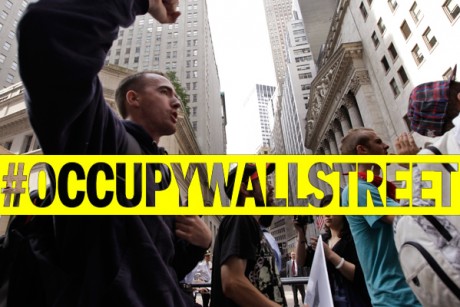 |
(Credit: Reuters/Brendan McDermid)
Monday was the one-year anniversary of the Occupy Wall Street movement. A few hundred Occupiers celebrated by roaming lower Manhattan, clogging intersections, and chanting loudly about the ills of Wall Street. The day’s events were a far cry from last year’s Occupy protests, when thousands gathered. (Notably, the NYPD showed little sympathy for the waning movement; over 100 Occupiers were arrested by Monday afternoon, mostly on disorderly conduct charges.)
Jeff Reeves, a financial industry guy and editor of Investor Place, recently proclaimed the death of the Occupy movement. And he mourned its passing because, in his opinion, “the cause of banking reform and regulation has never been more relevant.”
But I don’t think Mr. Reeves needs to worry too much. The Occupy movement may be down, but it’s certainly not out (at least not yet). Allow me to recap some of its more momentous moments in the past several months.
In May, Occupiers staged a brief sit-in at the New York State Attorney General’s Manhattan office, complaining about a lack of transparency and progress in federal investigations of “Wall Street criminals.” The protesters claimed that they were trying to propel the efforts of the NYS Attorney General, who is a co-chair of President Obama’s Residential Mortgage-Backed Securities Working Group, and assure that his investigation into irresponsible conduct was as strong and thorough as necessary.
Later that month, Occupy Wall Street sued NYC Mayor Michael Bloomberg and the NYPD for seizing about 3,000 books from its “People’s Library” during the surprise clearing of Zuccotti Park last fall. The federal lawsuit seeks damages of $47,000 to replace the books, library furnishings, computers, and electronic equipment; it also seeks to vindicate the plaintiffs’ rights under the First, Fourth, and Fourteenth amendments.
In July, two NYC law schools (Fordham and NYU) issued a report entitled Suppressing Protest: Human Rights Violations in the U.S. Response to Occupy Wall Street. The report details 130 alleged incidents of excessive force by the NYPD, as well as additional unjustified arrests, abuse of journalists, and unlawful closure of parks to protestors. According to Katherine Glenn, an adjunct professor at Fordham Law and a lead author of the report, NYC’s response to the Occupy movement “actually violates international law and, as such, sets a bad example to the rest of the world.” She hopes that the City will heed the advice contained within the report, and set things right “through reforms that reflect just and accountable policing practices.”
In addition to scrutiny of the NYPD and the City’s policies with respect to protesters, the Occupy arrests have also entangled Twitter in a bit of a legal quandary.
Back in April, a Manhattan Criminal Court Judge (M. Sciarrino Jr.) denied an arrested occupier’s attempt to quash a subpoena that the D.A. sent to Twitter for tweets the Occupier allegedly sent as he and others marched over the Brooklyn Bridge last fall (that particular march resulted in more than 700 arrests).
“The widely believed (though mistaken) notion that any disclosure of a user’s information would first be requested from the user and require approval by the user is understandable, but wrong,” the judge wrote, at the time, in People v. Harris, 2011NY080152. He ordered an in camera inspection of the tweets before distribution to the prosecution and defense.
At first, Twitter was reluctant to turn over the Occupy protester’s documents. But this month, just in time for the Occupy anniversary, Twitter did turn over his tweets and subscriber information, under the threat of a stiff contempt fine. The Criminal Court judge promised, however, not to review the tweets until another judge, hearing additional arguments from Twitter, rules on a stay of the order to produce them.
The case is being watched because of its implications for the new frontiers with respect to law enforcement’s access to social media postings. Although Twitter gave up the Occupier’s tweets for now, it is going forward with its fight; Twitter claims that its users have the right to oppose production of their information and content to law enforcement by virtue of its terms of service, federal law, and constitutional protections. It maintains that the Occupier’s tweets, though publicly posted, are nonetheless protected by the Fourth Amendment.
Prosecutors have argued, amongst other things, that neither the subpoena nor the judge’s order to turn over the tweets violates the Fourth Amendment because the Occupier can’t have a reasonable expectation of privacy to information he publicly and intentionally broadcast to the world.
Oh, and although I am not sure it made the news, I myself witnessed a marching Occupy Staten Island event. The short procession — 20 people at most, I’d say – carried a drum, a flag, and (I think) a pirate hat. They were getting on the Staten Island Ferry as I was deboarding. So consider, Mr. Reeves.

With respect to the Twitter subpoena, last week a NY Supreme Court Justice (Carol Huff) denied the Occupier’s stay request. And so it seems the the Criminal Court judge will go ahead and review the tweets and the Occupier’s Twitter user information to see if they are relevant in the criminal case against him (disorderly conduct for crossing the bridge)